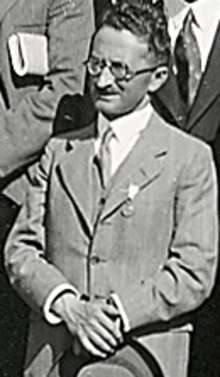Maurice Janet
Maurice Janet (1888–1983) was a French mathematician.

Zürich 1932
Education and career
In 1912 as a student he visited the University of Göttingen.[1] He was a professor at the University of Caen. He was an Invited Speaker of the International Congress of Mathematicians in 1924 in Toronto, in 1932 in Zürich, and in 1936 in Oslo.
Named in his honor are Janet bases, Janet sequences[2][3] and a related algorithm in the theory of systems of partial differential equations.[4] In 1926 he proved results that were later generalized by John Forbes Nash Jr. in his embedding theorem.
In 1948 Janet was the president of the Société Mathématique de France. He was a close friend of the mathematician Ernest Vessiot.
Selected publications
Articles
- Les systèmes d'équations aux dérivées partielles, Journal de mathématiques pures et appliquées 8 ser., t. 3 (1920), pages 65–123. (paper in which what is now called the Janet basis was introduced)
- "Les modules de formes algébriques et la théorie générale des systèmes différentiels" (PDF). Annales Scientifiques de l'École Normale Supérieure. series 3. 41: 27–65. 1924.
- "Sur la possibilité de plonger un espace riemannien donné dans un espace euclidien" (PDF). Annales de la Société Polonaise de Mathématique. 5. 1926.
- "Les systèmes d'équations aux dérivées partielles" (PDF). Mémorial des Sciences Mathématiques. 21: 1–55. 1927.
- "Les systèmes comprenant autant d'équations aux dérivées partielles que de fonctions inconnues. Caractéristiques singulières des systèmes normaux. Caractéristiques ordinaires des systèmes anormaux". Journal de Mathématiques Pures et Appliquées: 339–352. 1929.
Books
- Leçons sur les systèmes d'équations aux dérivées partielles. 1929.[5]
- Équations intégrales et applications à certains problèmes de la physique mathématique. 1941.
- Précis de calcul matriciel et de calcul opérationnel. 1954.
- Compléments divers sur la transformation de Laplace et les équations aux dérivés partielles. 1955.
- Mécanique analytique et mécanique céleste. Sujets proposés aux examens écrits de 1954 à 1959. 1966.
gollark: Not if I change my name globally!
gollark: You aren't passing in `message.content`, just `message`.
gollark: Hm. Interesting.
gollark: ummmmmnikos
gollark: Exotic Unicode characters, whitespace, etc.
References
- Laurent Mazliak (ed.), Le voyage de Maurice Janet à Göttingen. Carnet de voyage (automne 1912), Les Éditions Materiologiques 2013
- The mathematical foundations of general relavity revisited by Jean-François Pommaret, 2013
- A pedestrian approach to Cosserat/Maxwell/Weyl theory by Jean-François Pommaret, 2012
- Robertz, Daniel (2014). Formal algorithmic elimination for PDEs. Lecture Notes in Mathematics. 2121. Springer. p. 7. doi:10.1007/978-3-319-11445-3. ISBN 978-3-319-11444-6.
- Tamarkin, J. (1931). "Review : Leçons sur les systèmes d'équations aux dérivées partielles by Maurice Janet". Bulletin of the American Mathematical Society. 37 (9): 653–654. doi:10.1090/s0002-9904-1931-05210-1.
External links
This article is issued from Wikipedia. The text is licensed under Creative Commons - Attribution - Sharealike. Additional terms may apply for the media files.